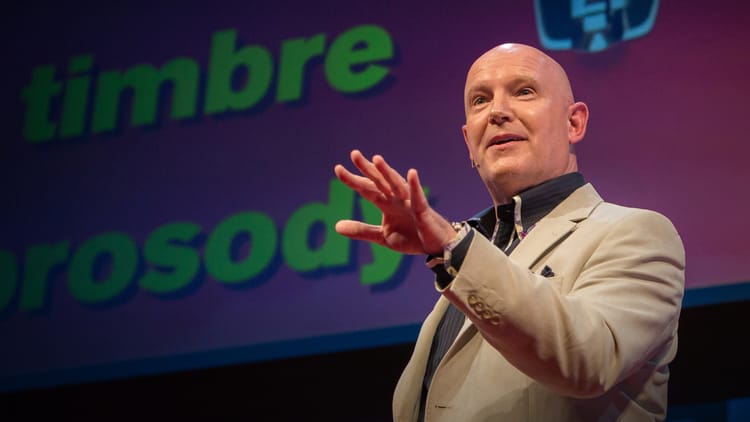“How to Speak So That People Want to Listen” by Julian Treasures
• public
Table of contents
Treasure provides practical tips for effective communication, emphasizing the importance of clear, authentic speech and engaging vocal delivery to capture and maintain the interest of listeners.
For Key Ideas, Questions and Quotes from this talk, you can scroll below.
Julian Treasures gave this speech at the TED Conference. All rights to the speech and the video above belong to TED.
About Julian Treasures
Julian Treasure is a sound and communication expert, award-winning author, and five-time TED speaker. (Source: Website)
Key Ideas From Talk
During a period when I was researching diction and how to speak better, I came across Julian's TED talk. In the talk, Julian summarizes practical ways to speak, focusing on emotional expression and language. He explains how we often have difficulty listening to others, and suggests that by speaking with certain emotions and purposes, we can be better heard.
Having an interest in the art of speaking doesn't require speaking in front of crowds. We all communicate with many people daily and strive to make ourselves understood. From this perspective, there's much to learn from Julian's TED talk. Here are the ideas that impressed me:
- The importance of conscious speaking: Julian emphasizes that we often neglect the way we speak and how it affects others. Being mindful of our words and delivery can significantly impact how people perceive and respond to us.
- The power of using the right voice qualities: Julian discusses four key voice qualities that can enhance our communication: clarity, variety, authenticity, and empathy. Employing these qualities can make our speech more engaging, relatable, and persuasive.
- The impact of paying attention to registers: Different situations require different vocal registers—namely, the chest voice, head voice, and falsetto. Being aware of these registers and using them appropriately can convey authority, warmth, and authenticity, fostering better connections with our audience.
- The value of using silence effectively: Silence can be a powerful tool in communication. Julian explains that strategic pauses can help us emphasize points, provide clarity, and create anticipation. Embracing silence allows for more impactful and meaningful conversations.
- The role of speech habits and filters: Our speech habits and filters, such as gossip, judging, negativity, complaining, and excuses, can hinder effective communication. Julian encourages us to be conscious of these habits and filters and work on replacing them with more positive and constructive patterns.
- The importance of practicing and honing our speaking skills: Speaking is a skill that can be improved through practice. Julian suggests exercises to enhance our speaking abilities, including reading aloud, exploring different vocal tones, and seeking feedback from trusted individuals.
Questions to Ask Ourselves
Conscious speaking:
- Am I mindful of how I speak and the impact it has on others?
- Do I take the time to consider my words before speaking, ensuring they convey my intended message effectively?
Voice qualities:
- How can I improve the clarity of my speech to ensure others understand me better?
- In what ways can I incorporate more variety in my tone and delivery to keep my audience engaged?
- Am I being authentic in my communication, expressing my true thoughts and emotions?
- Do I demonstrate empathy in my speech, considering the feelings and perspectives of others?
Vocal registers:
- Am I aware of the different vocal registers and how they can be used to convey different messages?
- In what situations should I use my chest voice to project confidence and authority?
- How can I utilize my head voice to create a sense of warmth and connection with my audience?
- When is it appropriate to employ falsetto for emphasis or to evoke certain emotions?
Effective use of silence:
- Do I embrace strategic pauses in my speech to emphasize important points or provide clarity?
- Am I comfortable with moments of silence during conversations, allowing them to create impact and space for reflection?
Speech habits and filters:
- What speech habits or filters do I need to be aware of that may hinder effective communication?
- How can I replace negative habits like gossip, judging, complaining, or making excuses with more positive and constructive patterns?
Practicing and honing speaking skills:
- Am I actively seeking opportunities to improve my speaking skills through practice and learning?
- Do I engage in exercises like reading aloud or exploring different vocal tones to enhance my speaking abilities?
- Do I seek feedback from trusted individuals to identify areas for improvement in my communication?
Notes From Talk
Related List and Guide
This talk is a part of following list: "Talks That Changed My Perspective".
